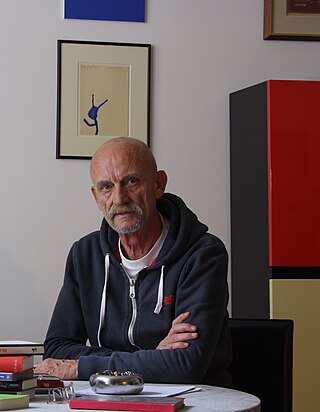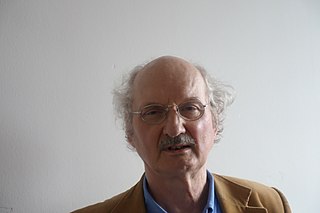Related Research Articles

Werner Sombart was a German economist, historian and sociologist. Head of the "Youngest Historical School," he was one of the leading Continental European social scientists during the first quarter of the 20th century. The term late capitalism is accredited to him. The concept of creative destruction associated with capitalism is also of his coinage. His magnum opus was Der moderne Kapitalismus. It was published in three volumes from 1902 through 1927. In Kapitalismus he described four stages in the development of capitalism from its earliest iteration as it evolved out of feudalism, which he called proto-capitalism to early, high and, finally, late capitalism —Spätkapitalismus— in the post World War I period.
Hans Kauffmann was a German art historian.
Gerhard Scherhorn was a German Professor and economist.

Martin Dannecker is a German sexologist and author.
Dieter Senghaas is a German social scientist and peace researcher.

Reimar Oltmanns is a well-known journalist and author in Germany.
Eckhard Jesse is a German political scientist. Born in Wurzen, Saxony, he held the chair for "political systems and political institutions" at the Technical University of Chemnitz from 1993 to 2014. Jesse is one of the best known German political scholars in the field of extremism and terrorism studies. He has also specialized in the study of German political parties and the German political system.

The siege of Godesberg, 18 November – 17 December 1583, was the first major siege of the Cologne War (1583–1589). Seeking to wrest control of an important fortification, Bavarian and mercenary soldiers surrounded the Godesberg, and the village then of the same name, now Bad Godesberg, located at its foot. On top of the mountain sat a formidable fortress, similarly named Godesburg, built in the early 13th century during a contest over the election of two competing archbishops.

Ruprecht of the Palatinate was the Archbishop and Prince Elector of Cologne from 1463 to 1480.
Paul Johannes Kevenhörster is Professor Emeritus of Political Science at the Westphalian William's University of Muenster in Germany. His work focuses on politics in Japan, municipal government and international development co-operation. He has served in academia as well as in a government agency and as consultant to a variety of organisations. Since 1966 Paul Kevenhörster is married to Gisela Drerup. They have three daughters, Uta, Eva and Ina, three granddaughters and a grandson, Milla and Emma Kevenhörster, Sophie and Lucas Russell.

Michael R. Krätke has studied economics, sociology and political science at the Free University Berlin, worked as Assistant professor of sociology at the Free University Berlin and at the University of Bielefeld, in 1981 he became Associate professor of political economy at the University of Amsterdam, was professor for sociology, chair of political economy and director of the Institute for Advanced Studies at Lancaster University. Since 1978, he has been an editor of the German scholarly journal spw – Zeitschrift für sozialistische Politik und Wirtschaft.
Stefan Fröhlich is a German political scientist and professor for International Relations at the Friedrich-Alexander-University Erlangen-Nuremberg. The emphasis in his work is on German foreign policy, transatlantic relations and US foreign policy, European foreign and security policy, and International Political Economy.
Wolfgang Zapf was a German sociologist.
Helmuth Osthoff was a German musicologist and composer. Much of his career was spent at Frankfurt University, prior to which he held posts at Halle University and Berlin University. He wrote the first major biography on the composer Josquin des Prez, published as a two volume monograph in 1962 and 1965
Josef Ehmer was an Austrian historian and professor emeritus at the University of Vienna.
Johannes Kunisch was a German historian. He held chairs of early modern history at the Goethe University Frankfurt. (1972-1976) and the University of Cologne (1976–2002). Through his publications Kunisch became one of the leading German early modern historians. His biography Frederick the Great, published in 2004 and widely acclaimed, gave lasting impulses to Prussian research.
Hans-Christof Kraus is a German historian.

Ewald Grothe is a German historian. Since 2009 he has been an extraordinary professor at the Bergische Universität Wuppertal and since 2011 he has been head of the Archive of Liberalism of the Friedrich Naumann Foundation for Freedom in Gummersbach.

Alois Mertes was a German diplomat, politician and Minister of State at the Foreign Office from 1982 until his death. He was a member of the Christian Democratic Union (CDU) from 1961 until his death.

Karl Müller, also Carl Müller was a German late Nazarene painter of the Düsseldorf school of painting.
References
- 1 2 3 4 Kürschners Deutscher Gelehrten-Kalender 1976, 12th ed., Berlin and New York: Walter de Gruyter, 1976, p. 1214.
- 1 2 3 "Finding Aid to the Ferdinand Aloys Hermens papers held at the Special Collections of the University Libraries at The Catholic University of America". Catholic University of America, University Libraries. Retrieved 2023-03-09.
- ↑ "Die Anfänge der Kölner Politikwissenschaft" (in German). Universität zu Köln. Archived from the original on 2009-05-10. Retrieved 2012-01-06.
- ↑ Forschungsinstitut für Politische Wissenschaft und Europäische Fragen, Jahresbericht 1989/90. Cologne, p. 5.
- ↑ Zur Neugestaltung des Bundestagswahlrechts. Bericht des vom Bundesminister des Innern eingesetzten Beirats für Fragen der Wahlrechtsreform. Bonn: Bundesministrium des Innern, 1968, p. 7.
- ↑ A complete list of his publications compiled by Hayo Uthoff was published in: Kaltefleiter-Gemmecke, Vera (ed.), Im Kampf für Frieden und Freiheit - Ferdinand A. Hermens 65 Jahre. Cologne: Heymanns Verlag, 1972, pp. 29-42.
- ↑ Book review by Philip S. Wilder Jr., in: Indiana Law Journal, vol. 34, no.2, 1959, pp. 352/353.